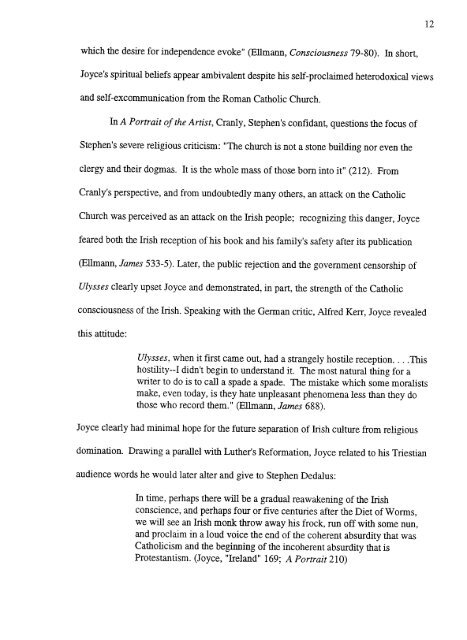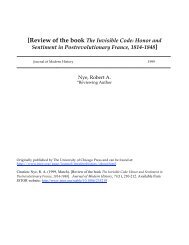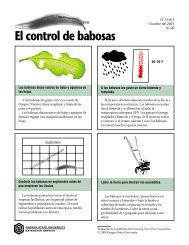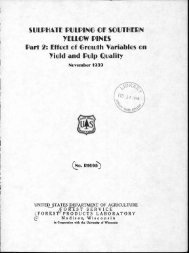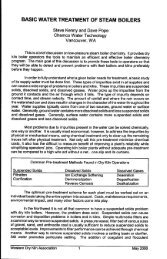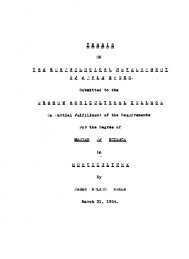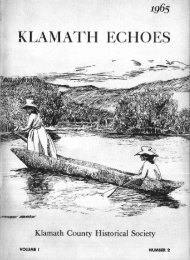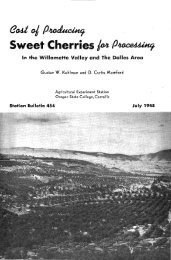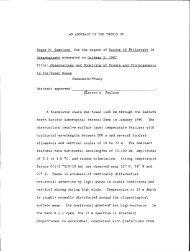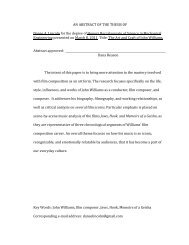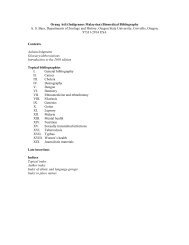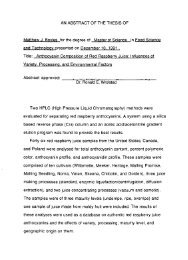Faubourg Saint Patrice - ScholarsArchive at Oregon State University
Faubourg Saint Patrice - ScholarsArchive at Oregon State University
Faubourg Saint Patrice - ScholarsArchive at Oregon State University
Create successful ePaper yourself
Turn your PDF publications into a flip-book with our unique Google optimized e-Paper software.
which the desire for independence evoke" (Ellmann, Consciousness 79-80). In short,<br />
Joyce's spiritual beliefs appear ambivalent despite his self-proclaimed heterodoxical views<br />
and self-excommunic<strong>at</strong>ion from the Roman C<strong>at</strong>holic Church.<br />
In A Portrait of the Artist, Cranly, Stephen's confidant, questions the focus of<br />
Stephen's severe religious criticism: "The church is not a stone building nor even the<br />
clergy and their dogmas. It is the whole mass of those born into it" (212). From<br />
Cranly's perspective, and from undoubtedly many others, an <strong>at</strong>tack on the C<strong>at</strong>holic<br />
Church was perceived as an <strong>at</strong>tack on the Irish people; recognizing this danger, Joyce<br />
feared both the Irish reception of his book and his family's safety after its public<strong>at</strong>ion<br />
( Ellmann, James 533-5). L<strong>at</strong>er, the public rejection and the government censorship of<br />
Ulysses clearly upset Joyce and demonstr<strong>at</strong>ed, in part, the strength of the C<strong>at</strong>holic<br />
consciousness of the Irish. Speaking with the German critic, Alfred Kerr, Joyce revealed<br />
this <strong>at</strong>titude:<br />
Ulysses, when it first came out, had a strangely hostile reception. . . .This<br />
hostility--I didn't begin to understand it. The most n<strong>at</strong>ural thing fora<br />
writer to do is to call a spade a spade. The mistake which some moralists<br />
make, even today, is they h<strong>at</strong>e unpleasant phenomena less than they do<br />
those who record them." (Ellmann, James 688).<br />
Joyce clearly had minimal hope for the future separ<strong>at</strong>ion of Irish culture from religious<br />
domin<strong>at</strong>ion. Drawing a parallel with Luther's Reform<strong>at</strong>ion, Joyce rel<strong>at</strong>ed to his Triestian<br />
audience words he would l<strong>at</strong>er alter and give to Stephen Dedalus:<br />
In time, perhaps there will be a gradual reawakening of the Irish<br />
conscience, and perhaps four or five centuries after the Diet of Worms,<br />
we will see an Irish monk throw away his frock, run off with some nun,<br />
and proclaim in a loud voice the end of the coherent absurdity th<strong>at</strong> was<br />
C<strong>at</strong>holicism and the beginning of the incoherent absurdity th<strong>at</strong> is<br />
Protestantism. (Joyce, "Ireland" 169; A Portrait 210)<br />
12


